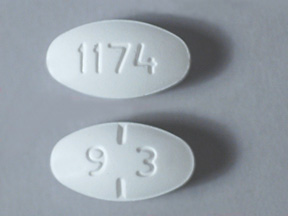Penicillin VK is a penicillin antibiotic that acts by inhibiting the bacterial wall synthesis. Read and know all about this drug including its uses, dosage, interactions and side effects.
What is Penicillin VK?
Page Contents
Penicillin VK is the brand name of Penicillin V Potassium. The “K” in its name stands for potassium and the addition of potassium results in better solubility and absorption in the body.
Some other common names of the antibiotic are Veetids, Beepen-VK, Pen-Vee K.
Penicillin VK vs. Penicillin G
Picture 1 – Penicillin VK
Penicillin VK has a number of advantages over Penicillin G. For instance, one can take the former even after meals as it is not affected by gastric acid. On the other hand, Penicillin G is inactivated by gastric acid and thus, cannot be given with meals. Another advantage of Penicillin VK is that it is a pregnancy risk factor B drug. Thus, it can safely be used during pregnancy.
Penicillin VK Uses
Know about the various conditions that this drug is used to cure.
- It is mainly used for treating Tonsillitis, Pharyngitis and other respiratory infections.
- Penicillin VK is also being employed for treating the middle ear infections.
- The drug also finds application in treating oral cavity infections.
- It is also used for treating rheumatic fever, scarlet fever and Ulcerative gingivitis.
- A typical use of the drug is for treating rat-bite fever.
Dosage and Administration of Penicillin VK
The antibiotic is available as 250 mg and 500 mg tablets. Its oral solution is available as 125 mg/5 mL and 250 mg/5 mL. Before measuring the dose of the drug, you should properly shake the oral suspension of the drug. Again, you should use a marked measuring spoon instead of a regular table spoon for measuring the dosage of the drug.
The overdose symptoms of Penicillin VK include decreased urination, skin rashes, mental confusion and convulsions.
Penicillin VK – Mechanism of Action
Penicillin VK shows its inhibitory action in the multiplication stage of the bacteria. It acts by inhibiting the bacterial wall synthesis. It is active against a wide range of micro-organisms including staphylococci (except penicillinase-producing strains), streptococci (groups A, C, G, H, L and M), and pneumococci.
The plasma half life of the drug is 0.5 to 1 hr. and the drug is excreted mainly through the renal route.
Penicillin VK Side Effects
Picture 2 – Penicillin VK Image
The common side effects of this antibiotic include difficulty in breathing, swelling of body parts like face, lips and tongue and allergic reactions. Know about some of the serious side effects caused by the administration of this medication:
- A typical side effect of the drug is the appearance of white patches inside the mouth or near the throat.
- Incidents of diarrhea have been reported in some people taking the drug.
- Flu like symptoms are also common, these include chills, cough and other respiratory problems.
- Decreased urination is also observed in some people.
- Convulsions, mental confusion and irritated behavior may occur.
- Nausea, vomiting and headache are some less serious side effects.
If you notice any of the abovementioned side effects, consult a doctor for proper medical advice. You may be advised to discontinue usage of the drug or take any alternative medicine. In a few cases, making adjustments in dosage can also help combat the side effects of this medication.
Penicillin VK Precautions
While taking this drug, a number of precautions must be followed to get the best possible results.
- Do not take the drug if you are allergic to antibiotics like Amoxicillin, Ampicillin, Carbenicllin and Oxacelin. The chances of getting allergies from Penicillin VK are higher.
- Inform your doctor in detail about your medical history and the disorders that you have suffered from. This is particularly important if you have suffered from a respiratory or bleeding disorder in the recent past.
- Avoid taking it with birth pills. Inform your doctor if you are going to take any birth pills to avoid pregnancy while using this drug. Your doctor may suggest you an alternative method for preventing pregnancy before administering this antibiotic.
- Inform your doctor in advance about any past cases of diarrhea. Penicillin VK is an antibiotic and may cause diarrhea. If you have already taken this drug and started noticing the symptoms of the disorder, seek medical advice immediately.
- Take the medication for the entire duration suggested by your doctor. Some people stop using it as soon as they begin to experience relief from their symptoms. However, complete relief from bacterial infections is only possible if you take the drug for the full duration.
Drug Interactions of Penicillin VK
The medicine does not show many drug interactions. The two drugs which are capable of interacting with Penicillin VK include Methotrexate and Probencid. Both of these are anti-cancer drugs. If you are using any of these medications, inform your doctor before taking this medicine for the treatment of bacterial infections.
References:
http://www.rxlist.com/penicillin-vk-drug.htm
http://www.drugs.com/pro/penicillin-vk.html
http://www.peoplespharmacy.com/2000/04/01/penicillin-vk/
http://en.wikipedia.org/wiki/Phenoxymethylpenicillin
http://www.ehow.com/facts_5543937_penicillin-vk-used.html
http://www.healthystock.net/drugs/penicillin-vk.shtml


